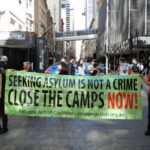Dutton Embarks on Racist Dog Whistling, as the Indefinite Detention Regime Crumbles

Indefinite detention has long been a questionable linchpin of the local asylum-seeking system. The oft-criticised measure has been one of last resort, as it applies to cases where people cannot be deported into harm, yet, as they’ve broken laws here, they’re now classed as unlawful noncitizens.
Habeas corpus is another basic principle underlying our justice system, which maintains there must be a purpose for incarcerating an individual. And the writ of habeas corpus requires that the detained appear in court, so a judge can determine whether their ongoing detention is lawful.
But on 7 November, the majority of the full bench of the High Court ruled that indefinite detention of people at risk of persecution if sent to their country of origin, as well as those who are stateless, is illegal regardless of the dangers authorities state they pose in the community.
The recent case, known as NZYQ, has since involved the release of a Rohingya man convicted of raping a 10-year-old, along with 84 other indefinite detainees, which led federal opposition leader Peter Dutton into a frenzy of racist fearmongering as he began barking about the imminent dangers.
The Albanese government responded by hurriedly drafting emergency laws to counter any risk posed by these people out in society, which was a piece of legislation that swept through both houses on Thursday.
But the absurd aspect to all this is that the threat-of-foreign-danger-in-the-suburbs rhetoric, and the release of offenders who’ve served their time, is exactly what happens with every other individual who’s broken any law in any manner: after serving their time, they re-enter the community.
Kneejerk legislating
Introduced by immigration minister Andrew Giles on Wednesday, the Migration Amendment (Bridging Visa Conditions) Bill 2023 sailed through both federals houses of parliament on Wednesday with bipartisan approval.
The legislation created a regime which sees those who both majors had previously sought to lock away in administrative detention forever, have been issued with visas on a conditional basis, where the individual is set to comply with a number of restrictions in order to live in the community.
As the minister explained during his second reading speech on the legislation, the bill amends the Migration Act 1958 (Cth) and its accompanying regulations “to support the effective management of noncitizens released from immigration detention following the decision of the High Court”.
“Let me be clear, the safety of the Australian community is the absolute priority of the Australian government,” added Giles, in line with the climate of fear that Dutton has stirred up around the issue. And he added that while the court hasn’t published its reasons, dozens are being released.
These 80-odd noncitizens have been issued with a bridging visa R. And the bill has established a regime of conditions the cohort must apply with, which includes excessive reporting obligations, a number of measures to keep tabs on them, as well as electronic monitoring and curfew compliance.
These people are required to check-in with authorities more often and stipulations require them to attend appointments that may facilitate their deportation. The ex-detainees must be transparent about their living arrangements, and they have to seek the minister’s approval if they want to work.
There are further requirements which involve noncitizens having to notify the department of any travel plans, along with the details of any associations or memberships they’ve taken up. And if they receive more than $10,000, they must report this, as well as if they’re aware of any illegal matters.
Dog whistling into law
“This is an obscene act against people who’ve just got a little sliver of liberty,” said Australian Greens Senator David Shoebridge as the bill was about to be put to the vote in the upper house on 16 November. “But it is an even more obscene political surrender by Labor to the Coalition.”
The Greens party justice spokesperson called out federal Labor on bowing to Dutton’s racist fearmongering, which saw the leader of the federal Liberals critiquing Labor’s lack of action on the allegedly urgent threat to the community that’s being posed by the release of detainees.
According to Shoebridge, Dutton provided amendments to the legislation “to add that little spice of cruelty to Labor’s already offensive bill”. And he added that the two majors should simply become “one big cruel party” as that is basically how governing bodies in Canberra are increasingly behaving.
On Wednesday, opposition leader Dutton began putting a series of questions to the immigration minister regarding what his department was doing about the “81 hardcore criminals released into the community”, and he moved a motion about a “breakdown of social cohesion”.
The points of motion include assertions that PM Anthony Albanese has released dozens of hardened criminals and has failed to produce any contingency plans to deal with them, whilst he blamed immigration for “the unprecedented and shocking mass release of dangerous criminal noncitizens”.
And despite the High Court finally ruling against indefinite detention, a practice the legal community has long called out as being against the rule of law, Labor has since rushed back to parliament brandishing a bill of new punishments applying to those who’ve long been confined illegally.
Shaky sovereign borders
The ruling against the use of indefinite detention in last week’s NZYQ, overturned the precedent set in 2004’s Al-Kateb versus Godwin, which found the indefinite detention of a stateless person was lawful, specifically in terms of Palestinian man Ahmed Al-Kateb.
Al-Kateb wasn’t provided protection by this country, and no other country would provide him with it. Although our nation later went on to grant him a visa.
As of August this year, our government had 124 individuals held in immigration detention, who had been there for over five years.
The indefinite detention regime almost came unstuck in 2021, when human rights lawyer Alison Battison identified a legal loophole in the Migration Act 1958, which resulted in her client, a Syrian man stuck in immigration detention for more than five years, being released into the community.
The Syrian man couldn’t be sent to his country of origin, as it was understood he’d likely confront persecution on return. And as Australia is a party to the 1951 Refugee Convention, it abides by the principle of nonrefoulement or not sending refugees back to imminent danger from where they fled.
However, the Morrison government responded to this development by passing a bill that clarified the nation’s international obligations for removal, which basically reversed the laws so that the court’s finding that indefinite detention was an issue, was reversed.
The most serious aspect of the current situation is not the release of former serious offenders into the community, as this is a process that happens regularly and it’s a rare occasion when such a release results in any major criminal issues.
Rather the most dangerous aspect to this dilemma is that Dutton has now embarked on a racist dog whistling campaign, claiming an outbreak of antisemitism is upon us, which is being coupled with the mass release of foreign detainees, whom he’s pitting against the rest of the community.
Indeed, recent events on the global stage have clearly displayed that the locking up a certain portion of the population long-term to forget about them doesn’t solve any problems, but instead it can produce much more detrimental outcomes than any issues that authorities were trying solve.
The colonial legacies that continue to see one social group dominating another is not the sort of politicking that’s ringing true any longer, especially when the international order is shifting, and on top of the issues caused by war, the ever-warming climate is producing a new sea of refugees.







